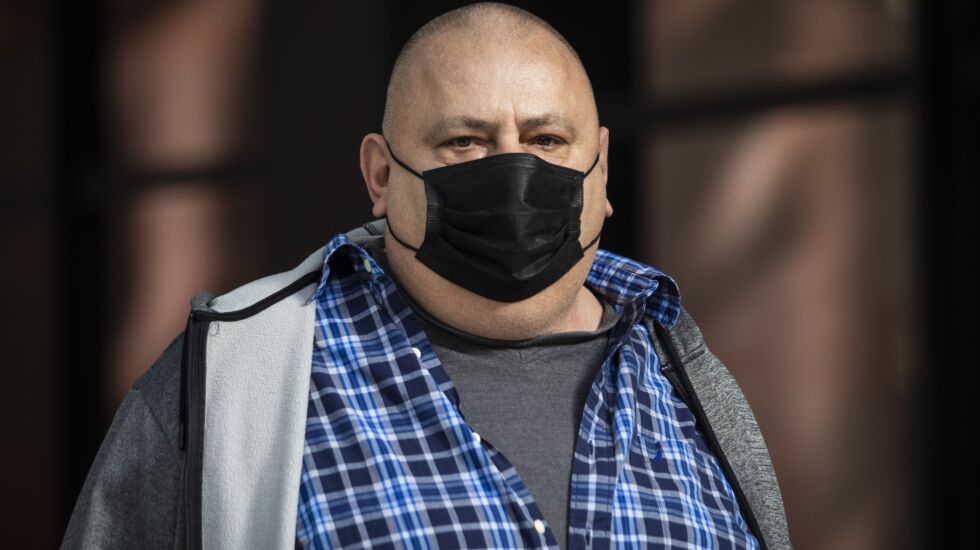
That’s according to records obtained by the Chicago Sun-Times that show Therese Gembara also told the police she planned to call the FBI on her husband.
In addition to what she told the police in 2012, a friend of hers and a former bank employee sent letters to federal authorities the same year to alert them about fraud at Washington Federal, according to court records.
What, if anything, came of all of this isn’t clear. Therese Gembara’s lawyer won’t talk about it. The Palos Hills police say they don’t have any records showing whether the department contacted the FBI about her complaints. Police reports don’t say whether Therese Gembara detailed what she thought was illegal. And the FBI won’t discuss the contacts.
But the revelations that the bank CEO’s wife knew about wrongdoing at Washington Federal years before investigators uncovered what they’ve described as a long-running fraud scheme adds another layer of intrigue to the still-unraveling mysteries surrounding the clout-heavy bank.
An ongoing federal investigation into one of the rare failures in recent years of a U.S. bank so far has led to criminal charges being filed against 15 people involved with Washington Federal. They included bank employees, members of the bank’s board of directors and customers.
Among them: former Ald. Patrick Daley Thompson.

Thompson — a nephew of former Mayor Richard M. Daley — is to be sentenced in July and had to leave office after being found guilty in February of lying to federal investigators and income-tax fraud for claiming tax deductions on payments toward loans from the bank even though he never paid any interest on them.
Therese Gembara’s comments to the police are cited in police records regarding a “disturbance complaint” on June 15, 2012, at the Gembaras’ 5,300-square-foot Palos Hills home.
That Friday afternoon, according to the records, John Gembara and his longtime friend, business partner and bank customer Robert M. Kowalski, got into a heated argument outside, and the police were called to the Gembaras’ southwest suburban home.
Kowalski — who’s now among those charged in the Washington Federal investigation — was “escorted away from the residence,” according to a police report.

After the police left, Gembara “became irate” and yelled at his wife, telling her “that he wanted a divorce,” she later told the police.
According to the police records, she also told the officers that “both her husband and Mr. Kowalski lied” to them “about the extent of their relationship. Mr. Gembara and Mr. Kowalski have been business partners for several years and have been personal friends since before Mr. and Mrs. Gembara met.”
At the time, Gembara and Kowalski co-owned a 46-foot Sundancer yacht — which was named Expelliarmus, for a wizard’s spell in the Harry Potter books — that federal authorities say they bought with money that was embezzled from the bank.
“Mrs. Gembara believes the argument that ensued related to illegal transactions that are being made, through the bank, by both her husband and Mr. Kowalski,” the officers wrote.
Therese Gembara also told the police “she has been in contact with a man which works for Mr. Gembara, about illegal activity, but has yet to bring all the evidence together.”
The police reports don’t identify that man or say whether she named him.
But they say: “Mrs. Gembara continued explaining that she felt in fear for her life and for her safety. Mrs. Gembara contacted both a civil/family attorney in regards to a divorce and also a criminal attorney to help with advice on what her options were concerning her husband’s involvement with the illegal activity. Mrs. Gembara believed that she would not be able to gather the information without being close to her husband.
“Once all the evidence is gathered, she plans on contacting the Federal Bureau of Investigation to investigate the case.”

Kowalski, who is awaiting trial on charges that he embezzled at least $31 million from Washington Federal, says he was waiting at the bank to talk with Gembara about loans to build two homes in Lincoln Park. But he says he found out “John had slipped out the back door and was not expected to return,” Kowalski says in an email responding to questions from the Sun-Times.
“Perturbed, I drove out to John’s new Palos Hills home. We then shared some angry words and were just beginning to talk reasonably when Therese intervened, relating that she had called the Palos Hills cops.”

Federal banking authorities closed the bank in December 2017. They cited “unsafe or unsound practices” and later said they believed the bank, which was at 2869 S. Archer Ave., had handed out more than $80 million in fraudulent loans by the time it was ordered closed. The Federal Deposit Insurance Corp. has paid $90 million to cover losses from the failed bank, and efforts continue to try to recover that money.
The Sun-Times previously has reported that the Office of the Comptroller of the Currency, an arm of the U.S. Department of Treasury that regulated Washington Federal, missed chances to halt the fraud sooner. The OCC audited the bank’s records for years before spotting the fraud scheme in 2017.
Under orders from federal regulators, the bank’s board suspended Gembara on Nov. 28, 2017, as they continued to pore over Washington Federal’s books.
Days later, on Dec. 3, 2017, Gembara, who was also the bank’s chief shareholder, was found dead with a rope around his neck in the main bedroom of a $1 million Park Ridge home owned by Marek Matczuk, a longtime friend and bank customer.

Matczuk is among those charged in the case. The roofer-turned-developer, who also did maintenance work at the bank and at Gembara’s home, is charged with looting $6 million from Washington Federal.
He told the Park Ridge police that Gembara, who was 56, had told him he “needed to hide due to ‘troubles’ at the bank,” records show.
Matczuk told the police that, on Dec. 1, 2017, he and Gembara had gone to a home Matczuk was building in Bucktown, where Gembara left his car in the garage. Matczuk said he told Gembara he could stay with him, and they drove to his home in Park Ridge.
Records show Matczuk told the police that he, his wife and their three children had dinner with Gembara, who stayed in the couple’s bedroom for the weekend.
The following afternoon, Dec. 2, 2017, Matczuk’s son drove Gembara to a Home Depot in Niles to buy some green rope that he told officers Gembara said he needed to hang Christmas decorations at his Palos Hills home. Security footage reviewed by police confirmed they were in the store, where they also stopped to have a hot dog.
Matczuk told the police that, after his family had dinner with Gembara, their guest went to the main bedroom for the night.
The next afternoon, when they hadn’t seen Gembara, Matczuk’s wife said they should check on him, and the couple unlocked the bedroom door and found Gembara dead, according to police reports.
The records show Gembara was sitting in a chair, fully clothed, with his glasses on and the green rope he’d bought at Home Depot wrapped around his neck and tied to the banister of a spiral staircase.
There was no suicide note, according to police records, which say Gembara’s wife got a one-word text from his phone that said only, “Bye.”
The Park Ridge police and the Cook County medical examiner’s office said Gembara died by suicide, though some of his family members and friends have said they don’t believe he killed himself.

Twelve days after his death, regulators closed Washington Federal.
Investigators said they discovered the bank had made loans without any paperwork, loans that were never paid back and that authorities believe were never meant to be repaid and fake loans that were never made but were on the bank’s books.
When the bank failed, Thompson had $219,000 in unpaid loans from Washington Federal, made between 2011 and 2014.
The 14 others who have been charged in the continuing investigation include Kowalski, his brother and sister, five bank employees and three of the four surviving board members. Those board members include William M. Mahon, a former Daley precinct captain who has resigned his city post as a deputy commissioner in the Department of Streets and Sanitation.

Luke Casson, a lawyer representing Therese Gembara, told the Sun-Times in 2018 that she wasn’t involved in any fraud scheme.
Kowalski, an attorney whose law license has been suspended, is handling his own legal defense, preparing his case while in custody at the Metropolitan Correctional Center in the South Loop. Scheduled to go on trial Sept. 26, he says he was set up by Gembara and other bank employees and that he didn’t embezzle any money from the bank.
Washington Federal’s origins date to 1913, when it opened to serve Polish immigrants on the South Side. Beside the main office on Archer Avenue, it also had a branch in Little Italy.
Therese Gembara worked for the bank, overseeing the payroll, which over the years has included several Gembara family members. She testified last September before the grand jury that’s been investigating Washington Federal.
Her late parents owned stock in the bank. Her father Edward J. Komperda — a Sears department store employee for 27 years who also served as financial secretary for the Polish National Alliance — was a member of the bank’s board from 1994 to 1998. Her mother Rosemary Komperda died in 2012, but bank statements show she was still listed in 2016 as owning 9.9% of stock in the bank.
Therese Gembara also spoke with the Palos Hills police on Nov. 27, 2017, less than a week before her husband was found dead, telling officers he “was missing, and she did not know where he was.”
According to a police report that day, he had called in “sick to work today because he said he wasn’t feeling well,” and Gembara’s sister Janice Weston, who was a vice president of the bank, told Therese Gembara he’d “canceled an important meeting.”
“Ms. Gembara was concerned for Mr. Gembara’s well-being due to him making comments last week about work,” mentioning “that his company was being audited by the government and had been stressed out by it. He shouted to her ‘they can take it all.’ . . . Ms. Gembara was having a hard time breathing and explained her chest hurt.”
An ambulance was dispatched, but she declined to go to a hospital.
A little over an hour later, police records show, “Ms. Gembara contacted the police to notify us Mr. Gembara returned home.
“Ms. Gembara gathered some belongings and explained she was going to stay at a friend’s house due to her being afraid of Mr. Gembara’s temper. Mr. Gembara explained he did not need any further assistance.”







